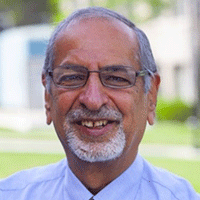
Dr. Arun Shukla
University of Rhode Island
Presenting in Track 12: Mechanics of Solids, Structures, & Fluids
Sponsor: Applied Mechanics Division
Presentation Title: Structural Response Under Extreme Underwater Loadings
Abstract: Underwater explosions and implosions are inherently complex and unique physical phenomena markedly distinct from those occurring above the surface. This distinctiveness is primarily attributed to the incompressible nature of water, which fundamentally alters the propagation and impact of shock and pressure waves. The lecture will focus on experimental investigations to study the shock loading and fluid-to-structure interaction between the gas bubble generated by an underwater explosion (UNDEX) and a nearby rigid and flexible plate. Experiments are performed by clamping plates to a support structure that is either air backed, or water backed. Though the shockwave produced by the initial detonation of an explosive can be a great source of damage during an UNDEX event, the resulting gas bubble's collapse can be an even greater source of damage. Results show that the explosive standoff distance, plate rigidity, and hydrostatic pressure can greatly change the bubble’s shape, size, migration speed, migration direction, jetting behavior, and damage to the nearby plate. The UNDEX bubble's collapse and concurrent bubble jetting are shown to be the primary causes of plate damage, including rupture, for the dimensionless standoff parameters studied. Experiments are also performed to investigate sympathetic implosions and interaction of an imploding cylinder with a nearby structure. State of the art pressure vessel facilities are used to study the implosion process. These pressure vessels are outfitted with several windows to allow the use of the 3D Digital Image Correlation (DIC) technique. The pressure histories generated by the implosion event are captured from dynamic pressure transducers mounted close to the specimen in all the experiments. These pressure histories are then related to real time deformations and velocities occurring on the shells. High speed images coupled with 3D-DIC technique are captured for better understanding of the deformation mechanisms and collapse modes of the structures during the experiments. The continuous evolution of this research area is essential for advancing maritime technology, ensuring the safety of undersea operations, and protecting marine environments from the adverse effects of extreme subaqueous loadings.
Biography: Dr. Shukla is the Simon Ostrach Professor of Mechanical Engineering at the University of Rhode Island (URI). He is also the co-founder and inaugural co-director of the National Institute for Undersea Vehicle Technology at URI. Dr. Shukla was elected to the European Academy of Sciences and Arts in 2011 and the Russian Academy of Engineering in 2015. He is a Fellow of the American Society of Mechanical Engineers, American Academy of Mechanics, Shock Wave Society (India) and the Society for Experimental Mechanics (SEM). He received the M.M. Frocht Award from SEM for “outstanding achievements as an educator in the field of experimental mechanics” and the B.J. Lazan Award from SEM for “outstanding technical contributions.” In 2003 he served as the President of SEM and in 2011 delivered the prestigious Murray Lecture at SEM. He has served as the Technical Editor of Experimental Mechanics and currently serves on the Editorial Boards of key engineering journals. Dr. Shukla has received the Distinguished Alumnus Award from his alma mater, IIT Kanpur. In 2023 he received the prestigious Drucker Medal from the American Society for Mechanical Engineers and the Theocaris Award from the SEM. He has served as the Clark B. Millikan Visiting Professor of Aerospace at the California Institute of Technology, USA and as the Satish Dhawan Visiting Chair at the Indian Institute of Sciences, Bangalore India. He has also served as the chair of the ASME’s Applied Mechanics Division, Executive Committee. Along with his many Ph.D. and M.S. students, he has published more than 450 papers in refereed journals and proceedings. Dr. Shukla has also authored and edited 10 books.